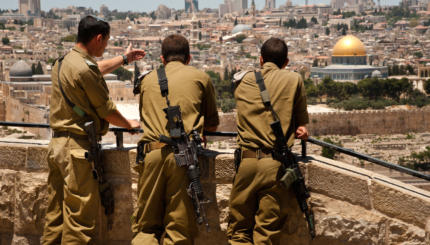Over the last few days, I’ve written much (I, II, III) about the Prayer for the State of Israel and Altshul’s decision to offer different versions of this liturgical component. But I’ve yet to compare the actual versions.
As mentioned, Version I was published after the founding of the State by the Chief Rabbinate; Version II was adapted from the Reconstructionist movement’s prayerbook Kol Haneshamah.
Version II begins:
Please God, bless the State of Israel. Protect it in the abundance of your love. Spread over it the shelter of your peace. Send forth your light and truth to those who lead and judge it, and to those who hold elective office. Establish in them, through your presence, wise counsel, that they might walk in the way of justice, freedom and integrity.
Noteworthy, is the fact that this alternative text is still, fundamentally, a Zionist prayer. It asks God to not only bless “Israel” but “the State of Israel.”
How does this differ from Version I?
Version I begins:
Our Father who is in heaven, Protector and Redeemer of Israel, bless the State of Israel, the dawn of our deliverance. Shield it beneath the wings of Your love; spread over it Your canopy of peace; send Your light and Your truth to its leaders, officers, and counselors, and direct them with Your good counsel.
Here we have the traditional male God-language and the assertion that the emergence of the state is part of a messianic process; it is “the dawn of our deliverance.”
Next are some more subtle differences. Version I:
Strengthen the defenders of our Holy Land; grant them, our God, salvation and crown them with victory. Establish peace in the land, and everlasting joy for its inhabitants.
And Version II:
Strengthen the hands of those who guard our holy land. Let them inherit salvation and life. And give peace to the land, and perpetual joy to all its inhabitants.
Version I’s use of the word “defenders” makes silent reference to aggressive enemies and perhaps a military conflict; and while both versions ask for the salvation of the “guardians,” only Version I asks for “victory.” While both versions then ask for peace and joy, the second version specifically asks for it for all Israel’s inhabitants.
Version I then makes reference to the ingathering of the exiles:
Remember our brethren, the whole house of Israel, in all the lands of their dispersion. Speedily bring them to Zion, Your city, to Jerusalem Your dwelling-place…
Version II has no call for this “universal aliyah,” but it does yearn for a connection between Israel and the Diaspora:
Appoint for a blessing all our kindred of the house of Israel in all the lands of their dispersion. Plant in their hearts a love to Zion.
Version II then makes a distinctly universalistic turn and ends with a messianic vision (though without reference to the actual Messiah), which focuses on the peace among Peoples that will exist when the world is redeemed:
And for all our people everywhere, may God be with them, and may they have the opportunity to go up to the land. Cause your spirit’s influence to emanate upon the dwellers of our holy land. Remove from their midst hatred and enmity, jealousy and wickedness. Plant in their hearts love and kinship, peace and friendship.And soon fulfill the vision of your profit, “Nation shall not lift up sword against nation. Let them learn no longer the ways of war.� And let us say, Amen.
Meanwhile, Version I calls for a strengthening of the Jewish community and its commitment to Torah and ends with a prayer for the arrival of the Messiah and the redemption of the world — including (it seems) its non-Jewish citizens:
Unite our hearts to love and revere Your name, and to observe all the precepts of Your Torah. Speedily send us Your righteous Messiah of the House of David, to redeem those waiting for Your salvation. Shine forth in Your glorious majesty over all the inhabitants of Your world. Let everything that breathes proclaim: “The Lord God of Israel is King; His majesty rules over all.� Amen. Selah.
Which version will I say? Probably Version II, as it does accord more with my values. But Version I never really bothered me.
It’s not horribly militaristic and does express some care and concern for those outside of the Jewish community (albeit in a Jewish utopia). As for the prayer’s messianic components and traditional imagery, well that’s found in much of the liturgy that I recite, and I’ve approached it here as I’ve approached it there: at times metaphorically, at times literally, and at times with ambiguous intention.
(BTW: We’ve published full English texts of both Version I and Version II here.)
Torah
Pronunced: TORE-uh, Origin: Hebrew, the Five Books of Moses.

